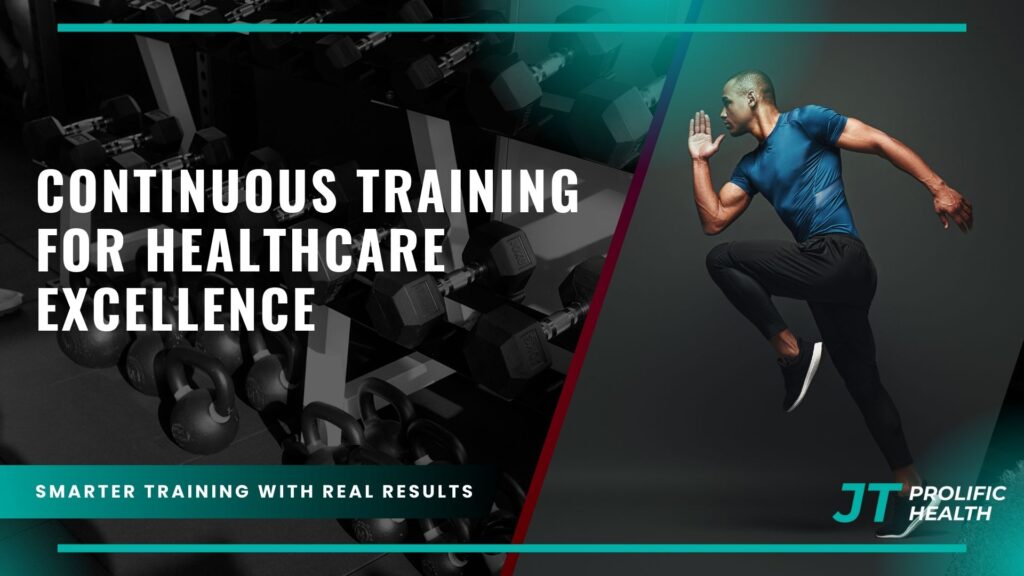Did you know skills in healthcare expire faster than a driver’s licence? IBM research reveals that expertise becomes outdated in just 2.5–5 years. For hospitals and clinics, this creates a race against time to keep staff prepared for evolving challenges.
At Prolific Health, we partner with medical teams across Vancouver and Richmond to turn this urgency into opportunity. Our programs focus on structured skill development, helping employees adapt to new technologies and protocols. Studies show organizations with updated learning strategies see 16% higher patient satisfaction and 10% productivity gains.
Why does this matter? Patient safety hinges on competency. Outdated knowledge risks errors. That’s why we design flexible programs tailored to healthcare’s unique demands—ensuring your team stays ahead of shifts in care standards.
Key Takeaways
- Healthcare skills lose relevance within 2.5–5 years, requiring regular updates.
- Prolific Health specializes in adaptable learning solutions for BC medical teams.
- Effective training boosts patient satisfaction by 16% and productivity by 10%.
- Patient safety depends on staff mastery of current practices.
- Modern programs address both individual growth and organizational goals.
Overview of Continuous Training in the Modern Healthcare Landscape
Medical advancements now outpace textbook revisions. In British Columbia, 65% of clinics report new protocols introduced yearly. This creates pressure for teams to stay current while managing patient care.


Understanding the Evolving Needs
Healthcare workers face dual challenges. Rapid tech adoption and shifting best practices require regular skill updates. A UK study found 30% of staff lack recent formal learning—a gap mirrored in Canadian settings.
Traditional workshops often miss the mark. They can’t keep up with real-time changes in diagnostics or treatment methods. Flexible, bite-sized programs prove more effective for busy professionals.
The Canadian Context for Healthcare Professionals
BC’s regulatory framework demands proof of competency. Vancouver and Richmond clinics must align with standards set by the College of Physicians and Surgeons. This ensures patient safety but adds complexity for employers.
Local health authorities prioritize adaptable learning solutions. Programs must fit rotating shifts and emergency workflows. When done right, they bridge the gap between compliance and practical application, supported by structured group strength sessions that build team synergy.
How Continuous Training Can Transform Your Team
Imagine your healthcare team handling emergencies with unmatched precision. Gallup research reveals organizations with engaged employees see 23% higher profitability. In medical settings, this translates to faster response times and fewer errors.


Why Ongoing Learning Is Essential
Regular skill updates combat knowledge decay in fast-paced environments. Teams that prioritize learning adapt better to new protocols. This builds confidence when managing complex cases.
Consider these measurable benefits:
- Stronger collaboration through shared learning experiences
- 21% fewer medication errors in clinics with monthly training
- Higher job satisfaction reducing staff turnover
Employees who grow their skills feel valued. This fosters professional pride and motivation. For patients, it means coordinated care from confident providers.
Organizations embracing learning cultures see ripple effects. Individual progress strengthens entire teams. Updated competencies become your clinic’s competitive edge through hybrid training models that balance onsite and digital learning.
Building a Skilled Workforce Through Continuous Learning
Healthcare expertise isn’t static—it grows through deliberate practice. At Prolific Health, we craft learning pathways that turn clinical teams into adaptable problem-solvers. Our work with Vancouver and Richmond organizations shows 76% of staff prioritize employers who fuel their growth.


Skill Development and Mastery
True proficiency demands more than occasional workshops. Medical protocols change monthly, and equipment evolves yearly. We structure programs around three pillars:
- Role-specific simulations for hands-on application
- Peer-led case reviews to refine decision-making
- Microlearning modules addressing emerging technologies
For example, Richmond nurses using our EHR mastery system reduced documentation errors by 18% in 6 months. Regular skill audits ensure knowledge translates to daily practice.
Fostering Career Advancement Opportunities
Growth-minded professionals seek clear progression paths. Our partnerships create stepping stones—from bedside care to leadership roles. One Vancouver clinic promoted 40% of staff internally after implementing tailored learning plans.
Individualized roadmaps align organizational needs with personal ambitions. Respiratory therapists transition to educator roles. Administrators gain data analysis skills for managerial positions. This approach cuts recruitment costs by 32% while preserving institutional wisdom.
Overcoming Challenges in Implementing Training Initiatives
How do you balance patient care with staff development when schedules are already stretched thin? Healthcare leaders in Vancouver and Richmond face this dilemma daily. At Prolific Health, we’ve helped clinics turn these obstacles into opportunities through adaptive solutions.
Managing Tight Schedules and Workloads
Shift workers need flexible learning options. Our partners succeed by embedding microlearning into existing routines. Five-minute modules during shift changes or case reviews during lunch breaks maintain momentum without overwhelming teams.
Consider these time-smart strategies:
- Modular content accessible via mobile devices
- Peer-led sessions during low-peak hours
- Simulation drills integrated into emergency preparedness
A Richmond urgent care center reduced training time by 40% using this approach. Their staff mastered new triage protocols through weekly 15-minute scenario practices.
Addressing Budget and Resource Constraints
Smart resource management unlocks potential. One Vancouver hospital cut external training costs by 62% by certifying internal mentors. Their respiratory therapists now lead equipment workshops during departmental meetings.
Key cost-effective methods include:
- Cross-training staff to share specialized skills
- Leveraging government-funded upskilling grants
- Using virtual reality for high-impact, low-repeat-cost simulations
Change management proves critical. We guide teams through phased rollouts, starting with early adopters. Regular feedback loops help refine processes while maintaining care standards. The result? Sustainable growth that aligns with BC’s healthcare priorities.
Strategic Approaches to Effective Continuous Training
What separates high-performing healthcare teams from those struggling to keep up? The answer lies in precise planning. At Prolific Health, we help Vancouver and Richmond clinics build customized development roadmaps through data-driven methods.
Assessing Your Team’s Learning Needs
Effective programs start with understanding gaps. Our process combines skills audits with staff surveys to map competencies against industry standards. This reveals where knowledge refreshers or new certifications matter most.
Engaging your team in assessments boosts buy-in. When nurses and technicians help identify priorities, training aligns with real workplace challenges. We focus on three critical areas:
- Patient safety protocols requiring immediate updates
- Equipment mastery for new diagnostic tools
- Communication skills affecting care coordination
Setting Clear, Measurable Objectives
Vague goals waste resources. We define targets like “Reduce medication errors by 15% in 90 days” or “Achieve 100% EHR proficiency by Q3.” These benchmarks let you track progress quarterly.
Objectives should serve dual purposes. They must advance organizational goals while supporting individual growth. A respiratory therapist might aim to lead equipment workshops, enhancing both leadership skills and team capabilities.
Regular check-ins ensure adaptations as needs evolve. Vancouver clinics using this approach report 22% faster adoption of new triage protocols. When strategy meets precision, training becomes a catalyst for excellence.
Leveraging E-Learning Platforms to Enhance Training Delivery
What if your team could update skills during coffee breaks? Modern healthcare demands learning methods that fit between patient charts and emergencies. Prolific Health’s digital solutions bridge this gap through adaptable e-learning platforms designed for Vancouver and Richmond clinics.
Benefits of Digital Tools and Microlearning
Short, focused modules prove ideal for busy medical staff. A nurse can master new wound care protocols in 7-minute videos before shifts. Pharmacists review drug interaction updates via mobile quizzes during downtime.
Key advantages include:
- 24/7 access to compliance courses and certification tracking
- Interactive simulations for high-risk scenario practice
- Progress dashboards showing team competency levels
Richmond clinics using our microlearning system reduced onboarding time by 35%. Staff complete 82% more annual training hours compared to traditional workshops.
Integrating Local Government Best Practices
BC’s health authorities set clear standards for digital education. We align platforms with Vancouver Coastal Health’s guidelines, ensuring courses meet provincial privacy and safety requirements.
Our technology solutions feature:
- Automatic reporting for College of Physicians audits
- Built-in updates when protocols change
- Multi-language support for diverse care teams
One Vancouver hospital cut compliance errors by 28% after syncing their e-learning platform with government-recommended checklists. This approach keeps your team current without administrative headaches.
The Role of Mentoring in Continuous Training
Did you know healthcare teams with mentorship programs retain 50% more staff? In Vancouver and Richmond clinics, experienced professionals hold invaluable knowledge that textbooks can’t capture. Structured guidance bridges gaps between textbook learning and real-world practice.
Introducing the Together Mentoring Platform
Prolific Health’s partnership with Together streamlines knowledge sharing. The platform uses smart matching to pair professionals based on skills, goals, and expertise areas. Key features include:
- Automated progress tracking for competency milestones
- Secure messaging for case discussions
- Analytics showing program impact on care quality
Richmond nurses using this system improved diagnostic accuracy by 19% within four months. Mentees access insights during shifts through mobile-friendly tools.
Maximising Mentorship for Professional Growth
Effective programs need clear frameworks. We help clinics establish:
- Monthly goal-setting sessions
- Peer feedback loops
- Leadership pathways for senior staff
Mentors gain fresh perspectives while refining coaching skills. A Vancouver hospital saw 33% faster promotion rates after implementing these strategies. Regular check-ins ensure alignment with BC’s evolving healthcare standards.
Impact of Continuous Training on Employee Engagement and Performance
When was the last time your team felt truly energized by their work? Research reveals healthcare professionals thrive when growth becomes part of daily practice. A Josh Bersin Company study shows staff who learn regularly report 47% less stress and 21% higher confidence—directly translating to better patient care.
Boosting Productivity Through Ongoing Development
Skilled employees work smarter, not harder. Vancouver clinics using structured programs handle 14% more patients weekly without compromising care quality. Gallup data confirms engaged teams deliver 23% higher productivity through:
- Faster adoption of new treatment protocols
- Reduced time spent correcting errors
- Improved coordination across departments
One Richmond hospital saw medication reconciliation times drop by 19% after implementing weekly skills refreshers. Staff confidence grows when knowledge stays current, creating ripple effects across your organisation.
Fostering Innovation in Your Workplace
Learning cultures spark creative problem-solving. Employees who regularly update skills propose 3x more process improvements according to BC Health data. Recent examples include:
- Nurses streamlining specimen labeling using QR codes
- Admin teams automating appointment reminders
- Technicians modifying equipment setups for faster sterilization
These innovations stem from staff feeling empowered to experiment. Prolific Health’s partners report 28% faster tech adoption rates when teams connect learning to real-world challenges.
Creating a Culture of Lifelong Learning in Your Organisation
True progress in healthcare happens when growth becomes part of your team’s DNA. For Vancouver and Richmond clinics, fostering this mindset starts with leadership commitment. Prolific Health helps organizations embed learning into daily workflows, turning every shift into an opportunity for development.
Establishing a Sustainable Learning Environment
Leaders set the tone by prioritizing skill-building. Share success stories from staff who’ve applied new knowledge. Celebrate small wins publicly—like a Richmond nurse streamlining IV setup after a simulation module.
Allocate dedicated time for growth. Protected learning hours prevent burnout. Try biweekly “knowledge exchanges” where teams discuss recent case studies. Pair these with mobile-friendly resources accessible during downtime.
Measure what matters. Track participation rates alongside patient outcomes. Vancouver clinics using this approach saw 19% faster protocol adoption. Regular feedback loops ensure programs stay relevant to BC’s healthcare needs.
Build peer networks that thrive on shared curiosity. Mentorship circles and cross-departmental projects break down silos. When learning becomes collective, your organization grows stronger together.




